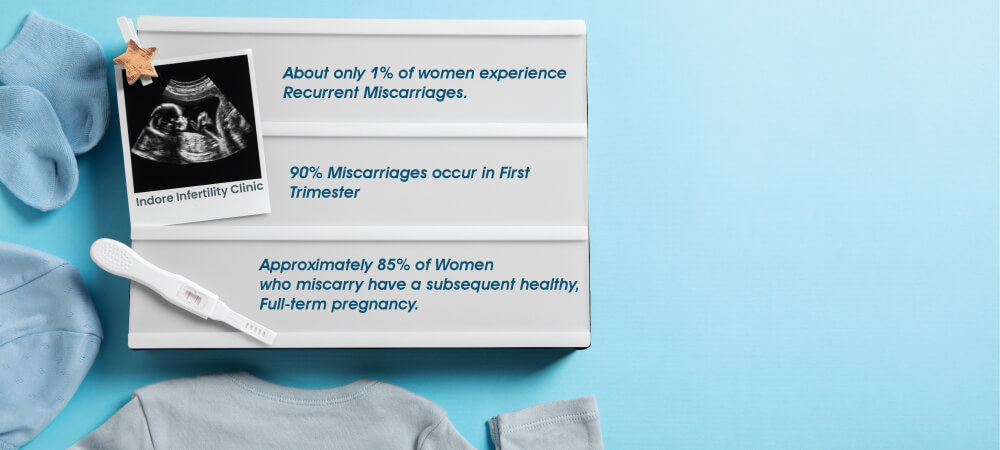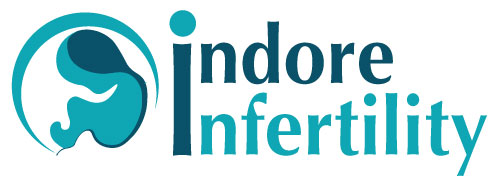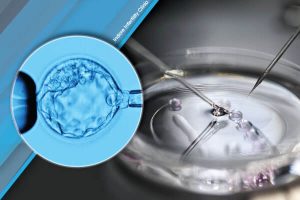

Miscarriage is a deeply personal and often heart-wrenching experience for a couple. Pregnancy after miscarriage is a real possibility. Just like in nature, where most pregnancies do not end in childbirth, human pregnancies can also end prematurely. It is a natural process that allows for natural selection, ensuring that pregnancies with chromosomal or genetic abnormalities are not carried further.
While experiencing a miscarriage can be emotionally devastating for couples who are trying to conceive, it’s important to remember that pregnancy after miscarriage is indeed possible, and many couples go on to have successful pregnancies. In this blog post, we will delve into the topic of pregnancy after miscarriage, exploring its emotional aspects, highlighting nature’s role in natural selection, and shedding light on the available treatment options at infertility clinics in Indore.
What is a Miscarriage?
Miscarriage, also called spontaneous abortion in medical terms, is when a pregnancy ends on its own before the 20th week.
There are many reasons for a miscarriage:
-
- Chromosomal Abnormalities: The most common reason for miscarriage is when the baby’s chromosomes have abnormalities. Most of the time the reason for chromosomal abnormality is due to abnormal chromosomes in the egg cells. The occurrence of abnormality in female eggs increases with female age. These issues can at times also occur randomly during fertilization or early cell division, which can cause problems with the baby’s development and make it difficult for the pregnancy to continue. If you’re looking for the best genetic counselor in Indore, we can help you understand and address this issue.
- Hormonal Imbalances: When the hormones needed to maintain a healthy pregnancy, like progesterone are imbalanced, it can disrupt the normal progress of pregnancy and lead to a miscarriage. It’s important to seek guidance from the best IVF doctor or infertility specialist who can help balance these hormones and support a successful pregnancy.
- Maternal Health Conditions: Certain health conditions in the mother, such as uncontrolled diabetes, thyroid disorders, polycystic ovary syndrome (PCOS), or autoimmune diseases can increase the chances of miscarriage. Seeking care from the best infertility specialist in Indore can help manage these conditions and improve the chances of a healthy pregnancy.
- Uterine Structural Abnormalities: Abnormalities in the shape or structure of the uterus, such as fibroids, polyps , or a septate uterus can affect the implantation, growth, and development of the embryo, leading to a miscarriage.
- Infections: Infections in the reproductive organs, such as bacterial vaginosis, pelvic inflammatory disease (PID) or sexually transmitted infections (STIs) can increase the risk of miscarriage. Seeking treatment from the best infertility specialist or IVF clinic can help diagnose and manage these infections reducing the risk of future pregnancy loss.
- Immunological Factors: Certain immune system disorders or abnormalities like antiphospholipid syndrome (APS) or immune reactions against the fetus can contribute to recurrent miscarriages. Consulting with the infertility specialist can help identify and manage these immunological factors to support a healthy pregnancy.
- Advanced Maternal Age: As women get older, the quality of their eggs decreases, increasing the likelihood of chromosomal abnormalities and miscarriages. If you’re considering pregnancy at an older age, it’s advisable to consult with the best IVF doctor in Indore who can provide guidance on fertility treatments that may increase the chances of a successful pregnancy.
- Lifestyle Factors: Poor maternal nutrition, excessive alcohol consumption, smoking, drug use, or exposure to environmental toxins can increase the risk of miscarriage. Making healthy lifestyle choices can help minimize these risks and support a healthy pregnancy.
- Unknown Causes: In some cases, the exact cause of miscarriage may remain unknown even after a thorough medical evaluation. It can be frustrating for couples seeking answers, but it’s important to remember that sometimes miscarriage occurs due to random and unpreventable factors. The best IVF clinics in Indore can provide compassionate care and support during this challenging time.
Remember, seeking assistance from infertility specialists or doctors who specialize in high-risk pregnancies can provide you with personalized care, guidance, and treatment options to address these factors and increase the chances of a successful pregnancy in the future.
Symptoms of Miscarriages
Here are some common symptoms of miscarriage. It’s important to note that these symptoms can vary in intensity and duration, and not all may be present in every case of miscarriage. If you experience any of these symptoms, it’s recommended to seek immediate medical attention for a proper evaluation and guidance.
- Vaginal bleeding, which can range from light spotting to heavy bleeding
- Abdominal cramping or pain, similar to menstrual cramps
- Passage of tissue or clot-like material from the vagina
- Back pain or lower backache
- Loss of pregnancy symptoms, such as breast tenderness or morning sickness
- The sudden decrease in the size of the abdomen
- Absence of fetal movements (in later stages of pregnancy)
- White-pink mucus discharge from the vagina

Why is miscarriage considered a positive indicator for future pregnancies
Miscarriage is often considered a good prognosis for future pregnancies because it indicates that the woman is capable of conceiving and getting pregnant. Here are some reasons why miscarriage can be seen as a positive indicator for future pregnancies:
- Natural Selection: Miscarriage can be nature’s way of natural selection, where pregnancies with chromosomal or genetic abnormalities are spontaneously terminated. This means that the body recognizes when something is not developing properly and ends the pregnancy to prevent the birth of a baby with severe abnormalities.
- Reproductive Health Assessment: After experiencing a miscarriage, Doctors often conduct a multitude of tests and evaluations to determine the root cause of the miscarriage. These assessments can provide valuable insights into the woman’s reproductive health and also help to identify any underlying issues that may have contributed to the miscarriage. By addressing these issues, the chances of a successful future pregnancy can be significantly improved.
- Better Preparation for Future Pregnancies: Miscarriage can be a deeply emotional and disturbing experience for couples. However, going through this loss can emotionally prepare individuals for the realities and uncertainties of future pregnancy. It can strengthen their emotional state and physical health, make necessary lifestyle changes, increase their knowledge about pregnancy, and help them appreciate the value of a healthy pregnancy when it does occur.
- Medical Interventions:For couples who experience recurrent miscarriages or have identified specific causes for their previous losses, medical interventions such as fertility treatments, hormonal therapy, or surgical procedures can be implemented to address the underlying cause. These interventions can significantly improve the chances of a successful pregnancy in the future.
- Supportive Care:After a miscarriage, couples often receive emotional support from their healthcare providers, counselors, support groups, or loved ones. This support system can play a crucial role in helping individuals cope with the loss, reduce stress and anxiety, and enhance overall well-being, ultimately contributing to a healthier future pregnancy.
It’s important to note that while miscarriage can indicate a good prognosis for future pregnancies, individual circumstances can vary. Each case should be evaluated by healthcare professionals who can provide personalized guidance and recommendations based on the specific situation.
Is it possible to have a successful pregnancy immediately after miscarriage?
While the idea of getting pregnant again right after a miscarriage may be appealing to couples, it’s important to allow some time for healing and emotional recovery. In most cases, healthcare providers recommend waiting until the woman has had at least one normal menstrual cycle before attempting to conceive again. This allows the body to recover fully and ensures that the next pregnancy has a better chance of being successful.
However, if this is the second miscarriage in a row, it is advisable to take advice from a specialist before trying to conceive again. Taking the time to grieve and seek emotional support during this period can also be beneficial. Each individual’s situation is unique and consulting with an Infertility Specialist can provide personalized guidance on the ideal timing for trying to conceive again after a miscarriage.
Signs of pregnancy after miscarriage
After experiencing a miscarriage, couples may wonder if they are pregnant again. While it’s essential to allow time for the body to heal and for the menstrual cycle to return to normal, there are some common signs that can indicate a new pregnancy. These signs include:
- Missed period
- Breast tenderness
- Fatigue
- Nausea or morning sickness
- Increased urination
- Heightened sense of smell
It’s important to remember that these signs can also be related to hormonal changes or other factors related to the aftermath of miscarriage. Confirming pregnancy after a miscarriage is best done through a medical evaluation by a specialist or a pregnancy test. Please make sure to undergo an early pregnancy ultrasound as soon as you figure out that you are pregnant.
What are the signs of infertility after miscarriage
Here are some common signs of infertility after miscarriage:
Difficulty conceiving: If you have been actively trying to conceive for an extended period after a miscarriage without success, it may indicate potential infertility.
Irregular menstrual cycles: If you experience irregular periods or notice significant changes in your menstrual cycle pattern after a miscarriage, it could be a sign of underlying fertility problems and needs further investigation.
Hormonal imbalances: Imbalances in hormones, such as progesterone or thyroid hormones, can affect your fertility. If you experience symptoms like persistent acne, excessive hair growth, or unexplained weight gain or loss, it may be indicative of hormonal imbalances.
Pelvic pain or discomfort: Chronic pelvic pain, particularly during ovulation or intercourse, could be a sign of conditions like endometriosis or pelvic inflammatory disease (PID), which can affect fertility.
Previous history of multiple miscarriages: Experiencing recurrent miscarriages after a previous loss may indicate underlying fertility issues that contribute to difficulties in achieving a successful pregnancy.
Age-related factors: As women age, fertility naturally declines. If you are above the age of 35 and have been unable to conceive after a miscarriage, it may be a sign of age-related fertility challenges.
Medical conditions: Certain medical conditions, such as polycystic ovary syndrome (PCOS), uterine abnormalities, or blocked fallopian tubes, can affect fertility and increase the risk of miscarriage.
It’s important to note that experiencing one or more of these signs does not guarantee infertility. If you have concerns about your fertility after a miscarriage, it’s best to consult with an infertility specialist, such as those at the best infertility clinics or with the best IVF doctors in Indore. They can perform comprehensive evaluations, offer personalized guidance, and provide appropriate treatment options to help you conceive successfully.
How soon can you get pregnant after a miscarriage at 5 to 6 weeks
It is generally recommended to wait for at least one normal menstrual cycle after a miscarriage at 5 weeks before attempting to conceive again. This allows time for physical healing and emotional recovery.
However, in cases of recurrent miscarriage, it is imperative that the couple consult a specialist and undergo a few tests to understand the reason behind miscarriage, before trying to conceive again.
Failure is not Final
Choose Hope!
It is important to remember that miscarriage is a fairly common occurrence impacting roughly 20% of young fertile patients and does not necessarily indicate abnormality or a lack of future fertility. The fact that many individuals who have experienced a miscarriage go on to have successful pregnancies can provide reassurance and comfort during the journey toward building a family.
Working closely with appropriate specialists, who can address any underlying issues and maintain a positive mindset can greatly increase the chances of a successful and healthy pregnancy in the future.




